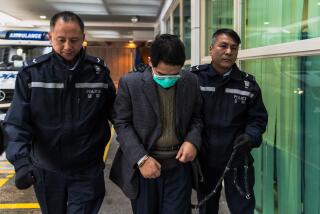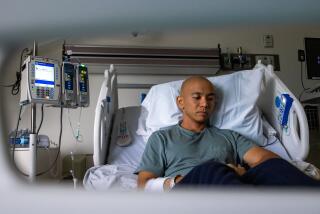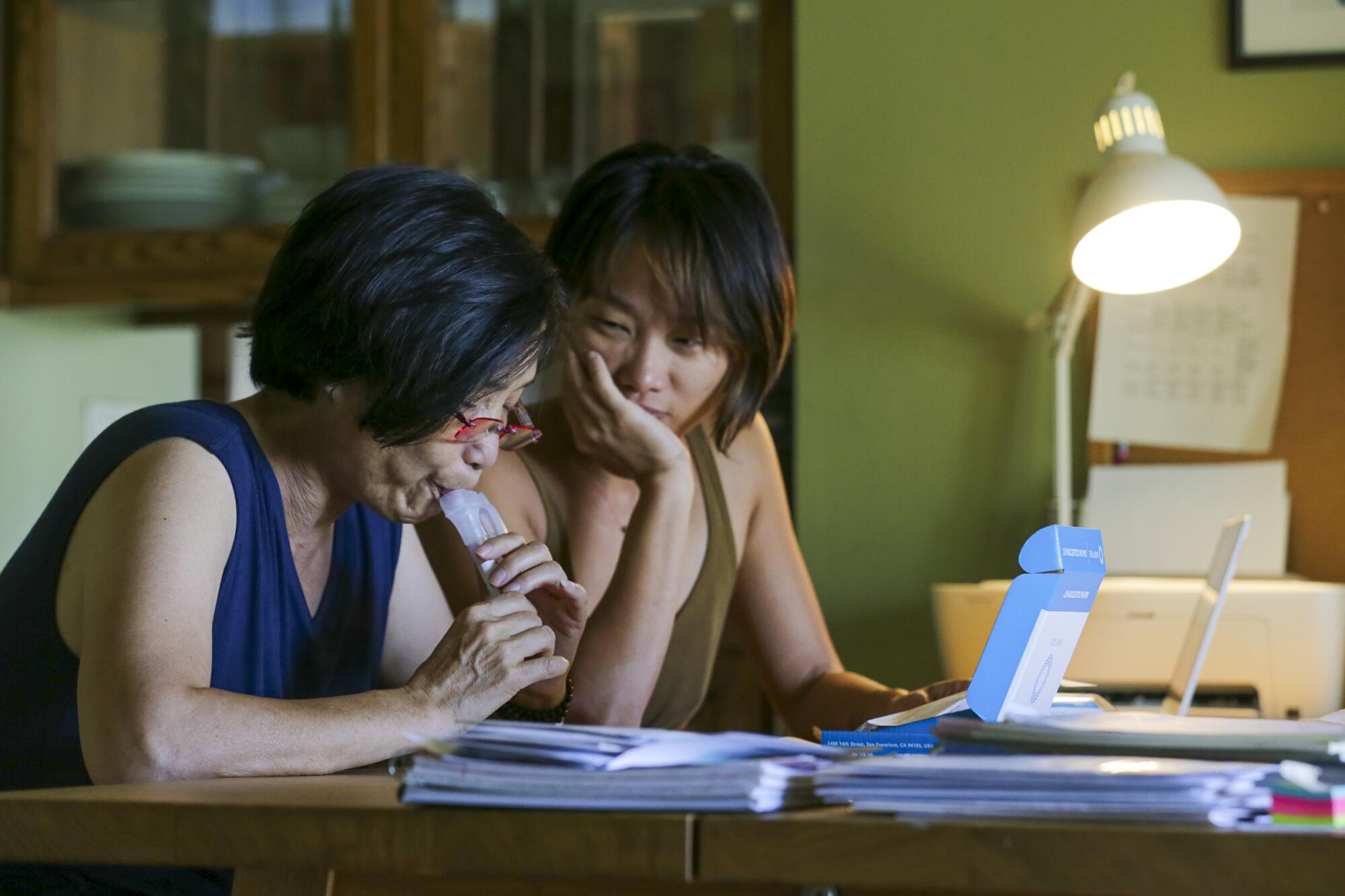
- Share via
As Yuyuan Lin’s yearly visit with her daughter and grandchildren in Southern California neared its end last March, she was prepared to go home to China with many warm memories.
In three months, she had seen the Antelope Valley poppy bloom, applauded her grandson Wilson as he was named January’s student of the month, watched her granddaughter Hannah sell Girl Scout cookies, celebrated Chinese New Year with homemade stir fry rice cake, dried fish and a glass of wine.
Three weeks before she and her husband, Cheng Xing Luo, were scheduled to fly home March 31, Lin discovered a lump under her left armpit.
For days, she kept it a secret from everyone but her husband.
When Lin finally told the rest of her family, she said it was probably just inflammation. She always traveled with antibiotics and was sure it would clear up after she popped a few. Don’t worry, she said, promising to schedule a doctor visit as soon as she landed in China.
Reflecting on the moment, her daughter Yi Luo regrets not taking the situation more seriously. But who could foresee that the coronavirus would sweep the world? Or that China would slash incoming flights to a weekly maximum of one per airline per foreign country?
Or that Lin’s flight home would be postponed?
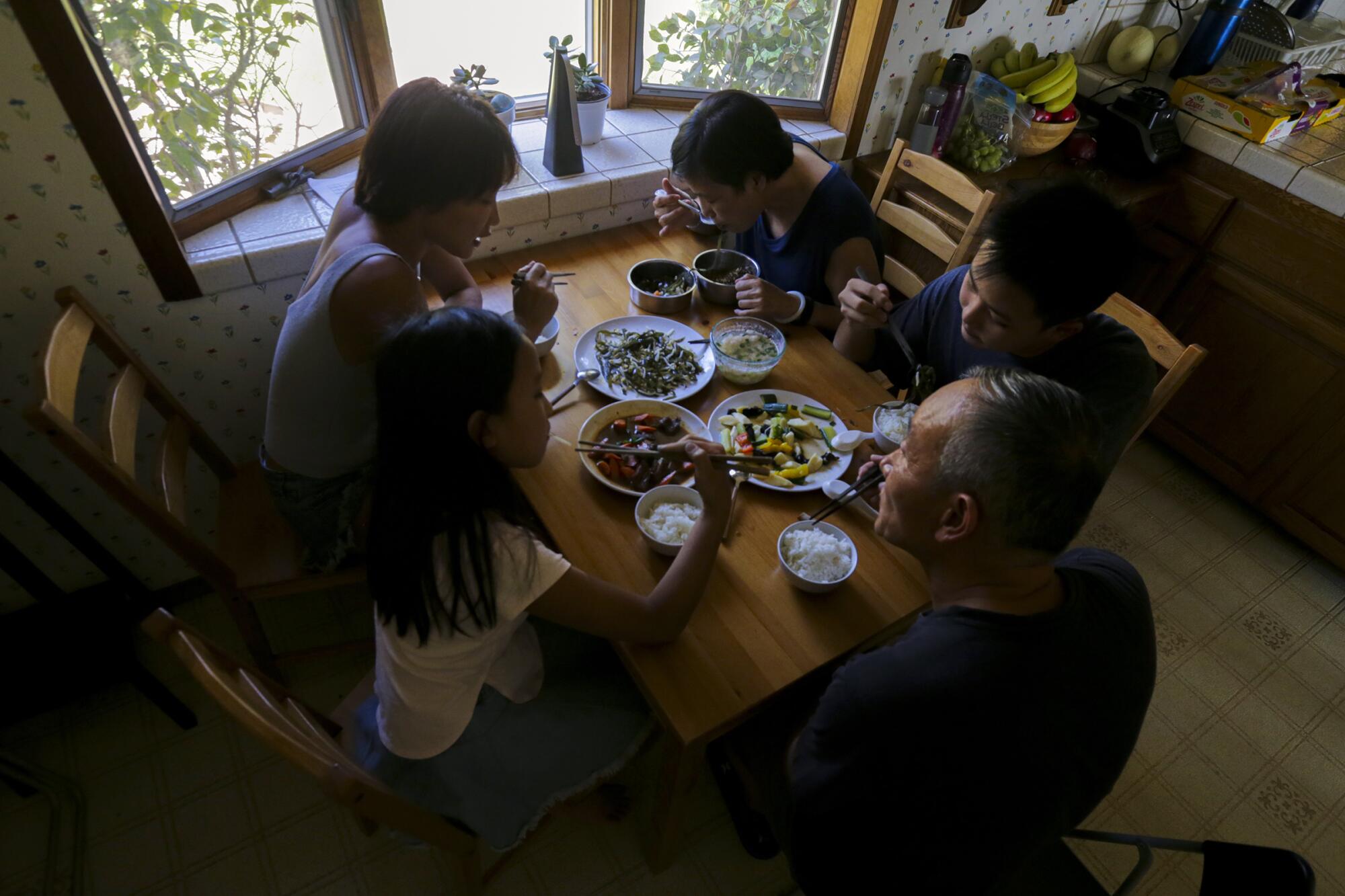
Since then, Luo, a single mom and her parents’ only child, has been forced to take charge of navigating two of the country’s most complex and fluctuating systems — healthcare and immigration — amid the biggest public health crisis in a century, along with one of California’s worst fire seasons in history.
Caught between the virus and the unforgiving Trump-era stance on immigration, Luo’s mother and father are now trapped indefinitely in Southern California, watching their medical expenses mount along with family tension and uncertainty.
Their ordeal was the product of unlucky twists and unfortunate timing, but one that also underscores the consequences possible for short-term visitors stuck in the U.S. during the pandemic. Thousands of other visitors to the United States found themselves stranded here after countries from Argentina to Australia closed their borders.
Data from January through April obtained from Customs and Border Protection by the Cato Institute, a libertarian think tank, showed that 6.1 million foreign visitors were unexpectedly stranded in the U.S. beyond their initial departure dates. Cato analyst David Bier wrote in a June policy brief that visitors scrambled to extend their legal stays, but many visas had already expired. It’s unclear how many people remain stuck.
Other countries have been more lenient. As COVID-19 cases multiplied, China automatically extended work and residency permits and provided welfare support to its migrant labor force, according to a May brief by the Migration Policy Institute, a nonpartisan think tank. Portugal temporarily treated all foreign nationals with pending immigration applications as permanent residents, allowing them to access healthcare and other benefits.
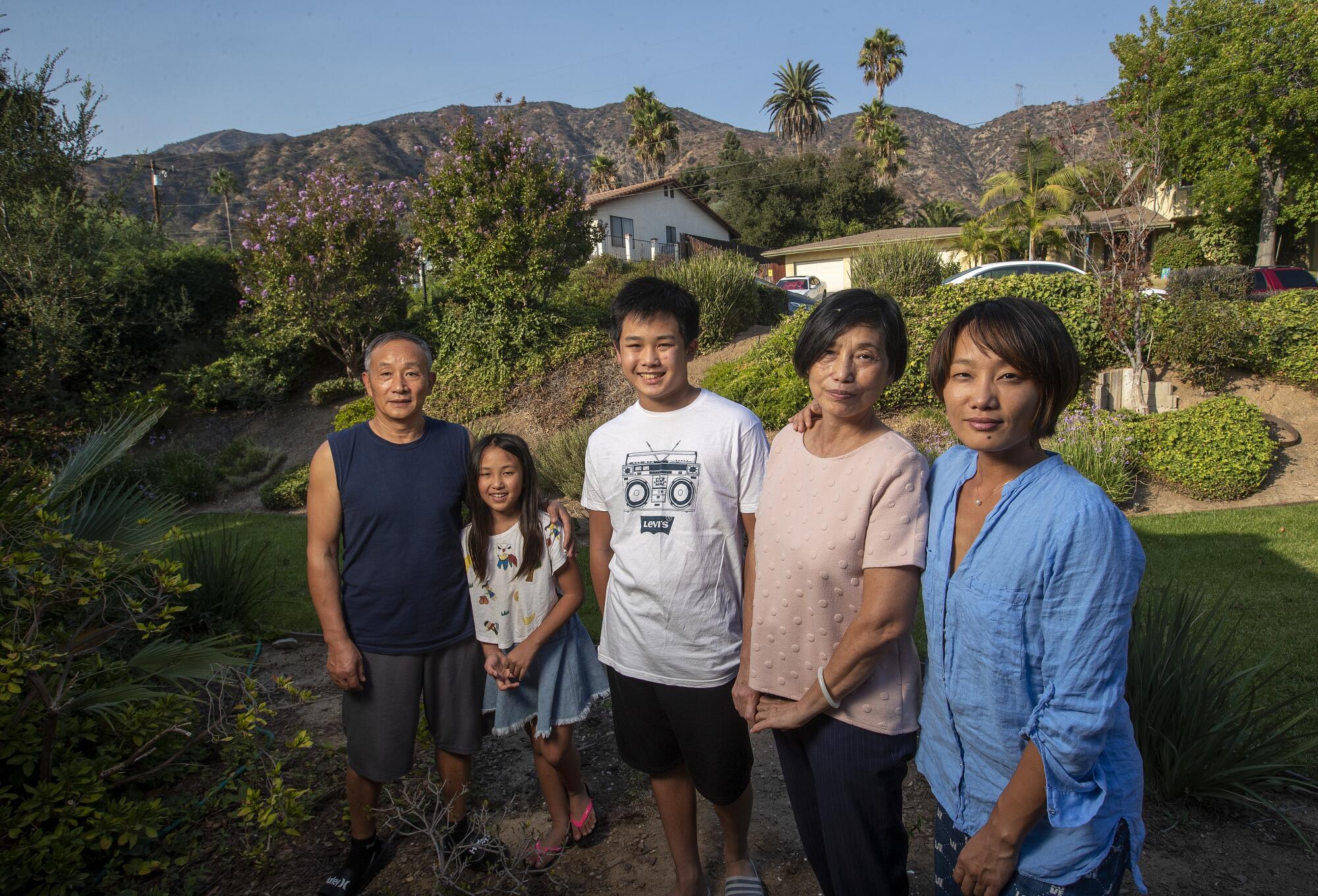
Meanwhile, U.S. Citizenship and Immigration Services shut down in-person processing and came close to laying off 75% of its staff. Processing times soared.
Some visitors who applied for visa extensions because of the pandemic already have been denied, said Sarah Pierce, a policy analyst at MPI.
“The failure of the U.S. immigration agency to acknowledge the difficult situation that the pandemic has placed temporary visitors in has made life extraordinarily difficult for these individuals,” she said.
In July, Luo paid $540 to apply for an extension to her parents’ visas until the end of the year. Their visas have now expired, and they are still waiting for a response.
According to a government guide to visa extensions, people in limbo like Lin and her husband are considered “out of status” and could be subject to deportation.
Luo worries that if her parents are expelled from the country they also could be banned for years from coming back.
“This adds another layer of anxiety,” Luo said. “We don’t have a say here. We don’t have a voice.”
USCIS declined to comment about Lin’s case. But according to the agency’s website, visitor visa extensions through the California service center are estimated to take up to 17.5 months to process.
USCIS released guidance recognizing challenges caused by the pandemic, but made no promises, simply noting the agency can decide “whether to excuse delays in filing documents based on extraordinary circumstances.”
For Luo and her mother, the delays and uncertainly eventually led to panic. By August, the lump Lin had detected had ballooned and was bulging from her body.
Luo took her mother to an urgent care facility, and on Aug. 20, Lin received her biopsy results: invasive stage three triple negative breast cancer. It had already spread to her lymph nodes.
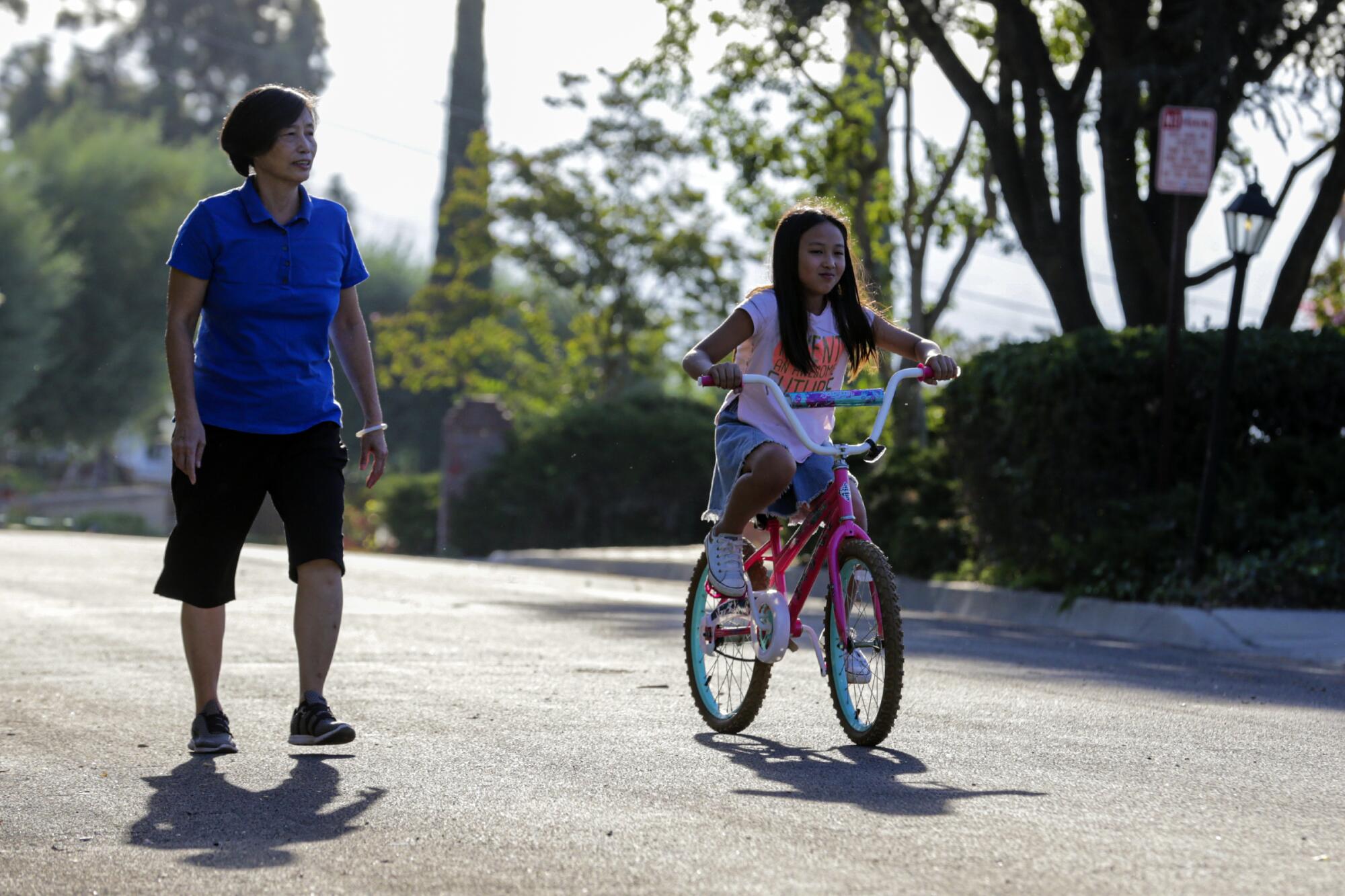
The Chinese Consulate in Los Angeles advised that Lin get treated in the U.S. Upon returning to China, Luo was told, her mother would have to quarantine for two weeks in a hotel at her own expense with no guarantee that she could see a doctor before her release.
Luo was still determined to get her parents home and after repeated efforts secured a Sept. 2 flight from San Diego to Shanghai. The flight awaited final confirmation but, feeling hopeful, her parents packed their suitcases anyway.
The flight was canceled.
The next few weeks were a whirlwind. Luo juggled her mother’s diagnosis with her part-time job doing marketing for a nonprofit youth mentoring program while helping her children navigate online learning.
Luo and her children had arrived in Los Angeles in 2016, ready for a fresh start after her marriage had ended. She had received a green card through her husband, a U.S. citizen, and they could stay rent-free in her in-laws’ home in the foothill community of Bradbury.
Following her mother’s diagnosis, Luo had to cut back on work and apply for unemployment and food stamps. Her parents’ retirement benefits offered some help, but hospital bills began adding up: the $759 consultation, the $5,998 mammogram and ultrasound, the $2,578 biopsy, the $2,174 for chemotherapy.
As an international patient, Lin doesn’t qualify for financial assistance. A patient services manager at the nearby City of Hope Medical Center told her daughter that treatment could cost up to $300,000.
I need to be strong for everyone in the house
— Yi Luo
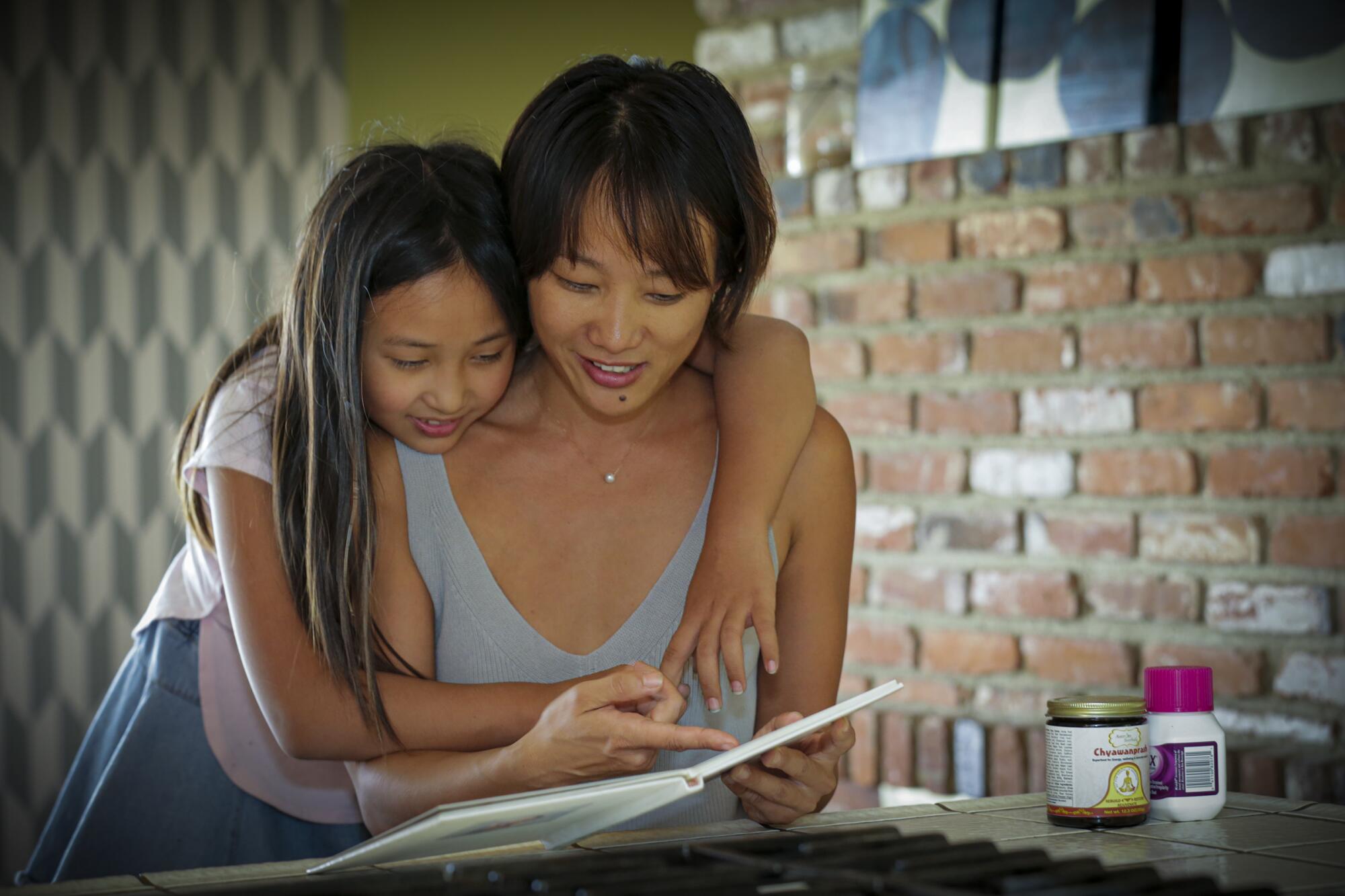
Luo initiated an insurance plan for her mother — at $1,700 a month.
Between medical appointments, Luo researched vitamins and supplements. She took her mother to a Chinese herbalist and placed her on a vegan diet.
She was determined and relentless. She was also overwhelmed.
“I need to be strong for everyone in the house,” she said.
On Sept. 6, three days before Lin was scheduled to receive her first chemotherapy session, the forest just north of the family’s home became engulfed in flames. They evacuated for the Bobcat fire, which became one of the largest fires in L.A. County history after scorching more than 115,000 acres mostly in the Angeles National Forest.
“Good thing I’m an optimistic person,” Luo joked the morning they evacuated.
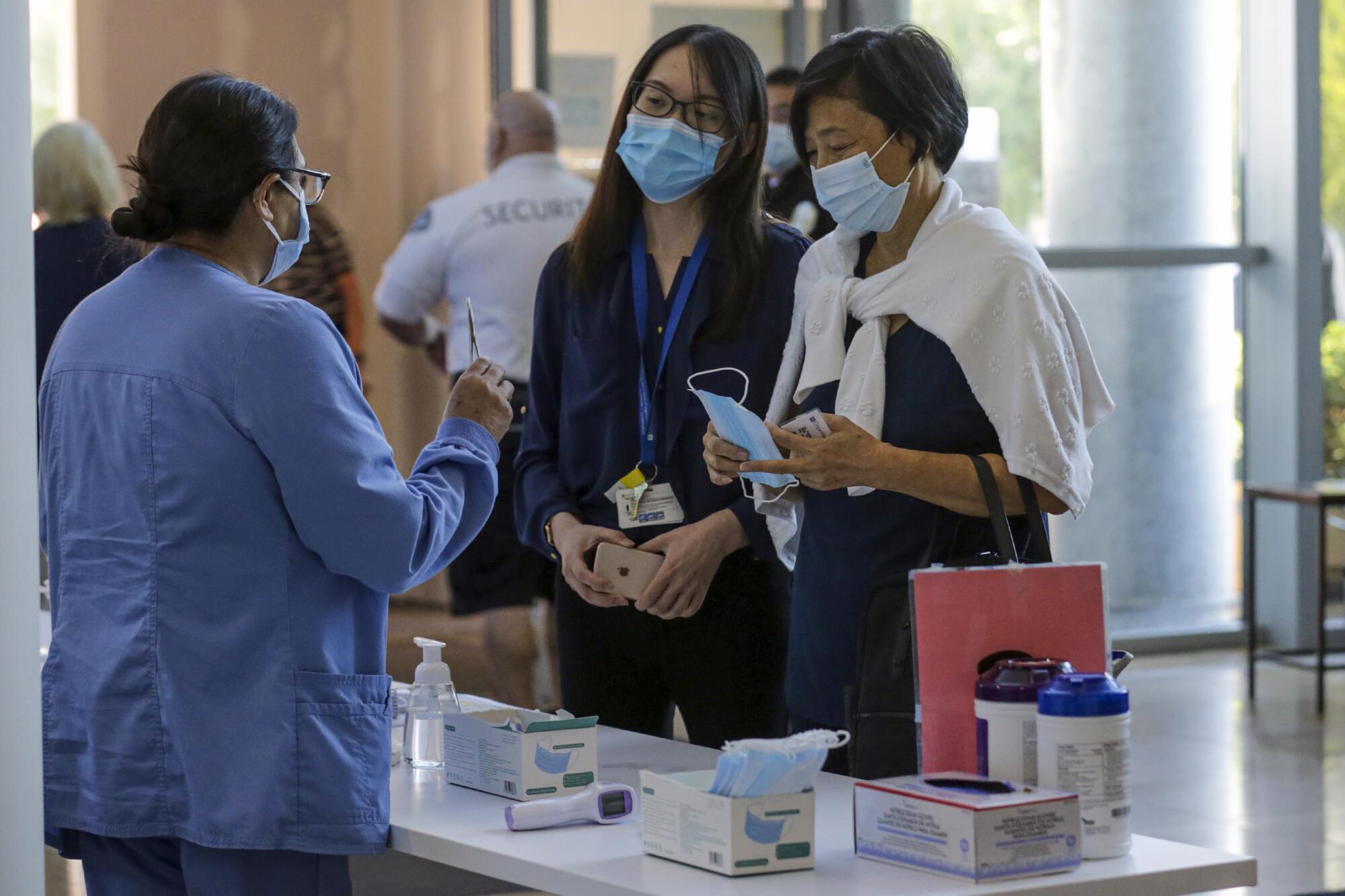
When they returned home in time for a chemo appointment a week later, their neighborhood was dark and smoky. At the hospital, the appointment was postponed by two more days because of the air quality.
“I said no, please, you guys don’t understand what every day means to us. The cancer cells are spreading. It’s really frustrating and very stressful for our mental health,” Luo said.
On the morning of her second chemo infusion, Lin stepped out for a walk in Puma trainers, Bermuda shorts and a blue polo shirt, her chin-length hair tucked behind her ears. She trailed behind her granddaughter, Hannah, who rode up and down their quiet street on her pink bicycle.
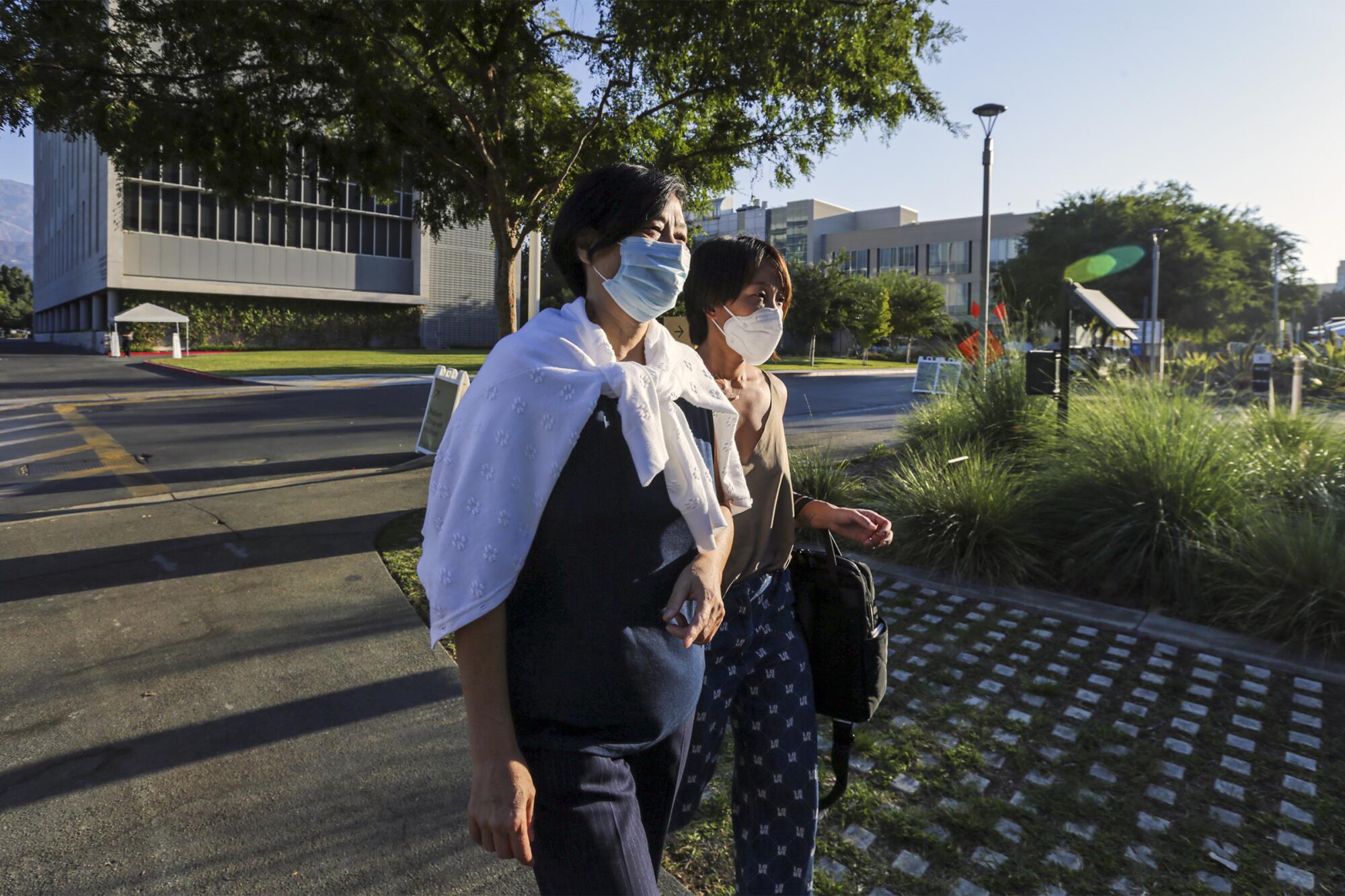
Luo dropped her mother off at City of Hope after breakfast. The doctor called soon after she returned home. The pandemic prevented Luo from joining her mother at checkups, but she listened in by phone.
“Oh, my goodness, your poor mother is going through a lot,” Dr. Mina Sedrak said before turning to Lin and her Mandarin interpreter in his office. Lin told him her tumor felt smaller.
“The fact that it has been shrinking is a good sign,” he said. “We want to treat you aggressively so we can control it.”
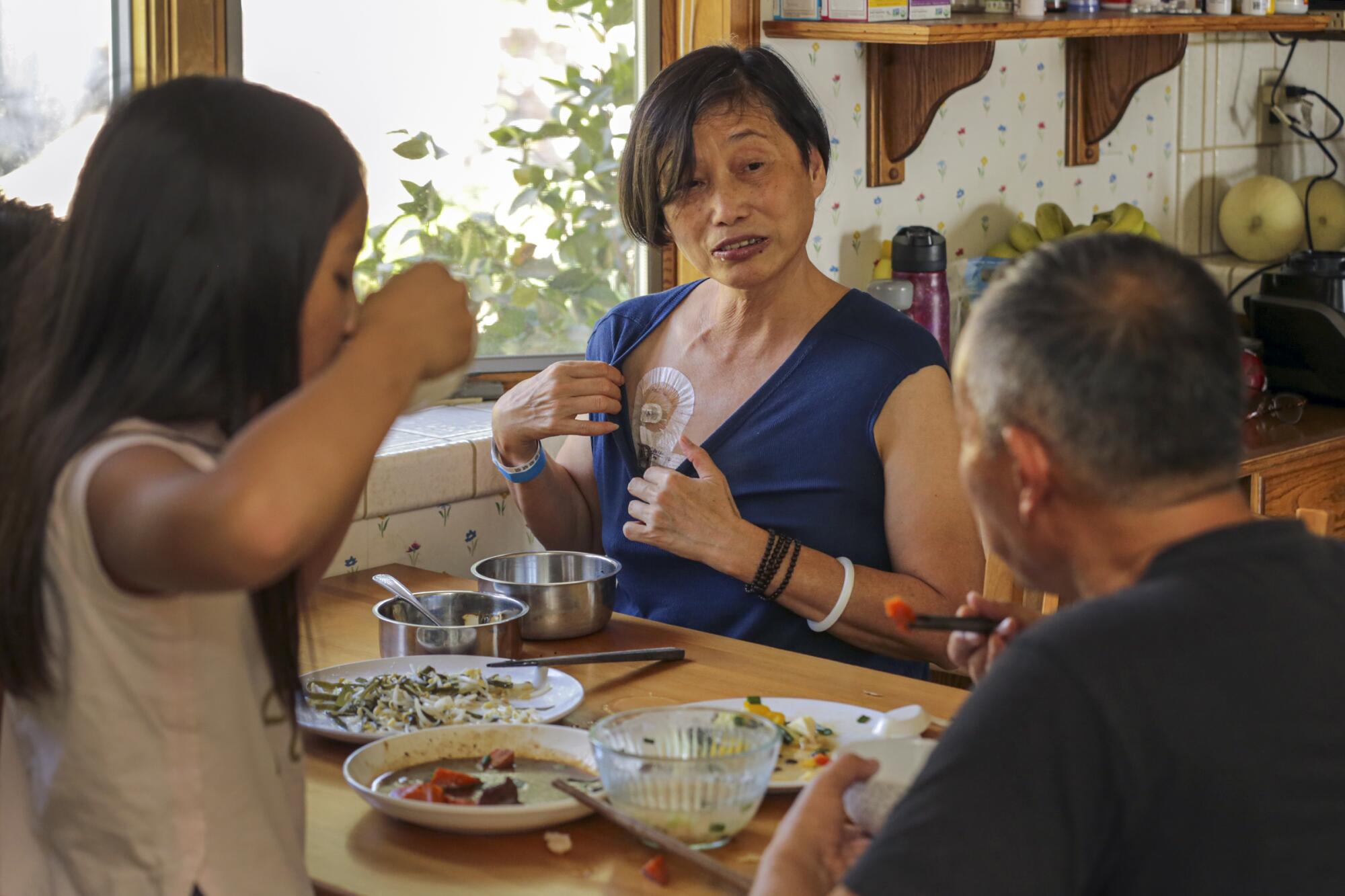
To do that, Sedrak said, she would need more chemotherapy, followed by surgery and then radiation.
At home, Luo smiled. “That’s great news,” she said.
But by October, four rounds of chemo had left Lin too exhausted to go on her daily walks. She started wearing her winter jacket to the cold hospital. Each morning as she lifted her head off her pillow, she left behind bigger clumps of hair.
Lin began keeping a journal, hoping that her thoughts might someday offer comfort to others. On Oct. 5, she wrote that she could feel her skin wrinkling and her muscles loosening:
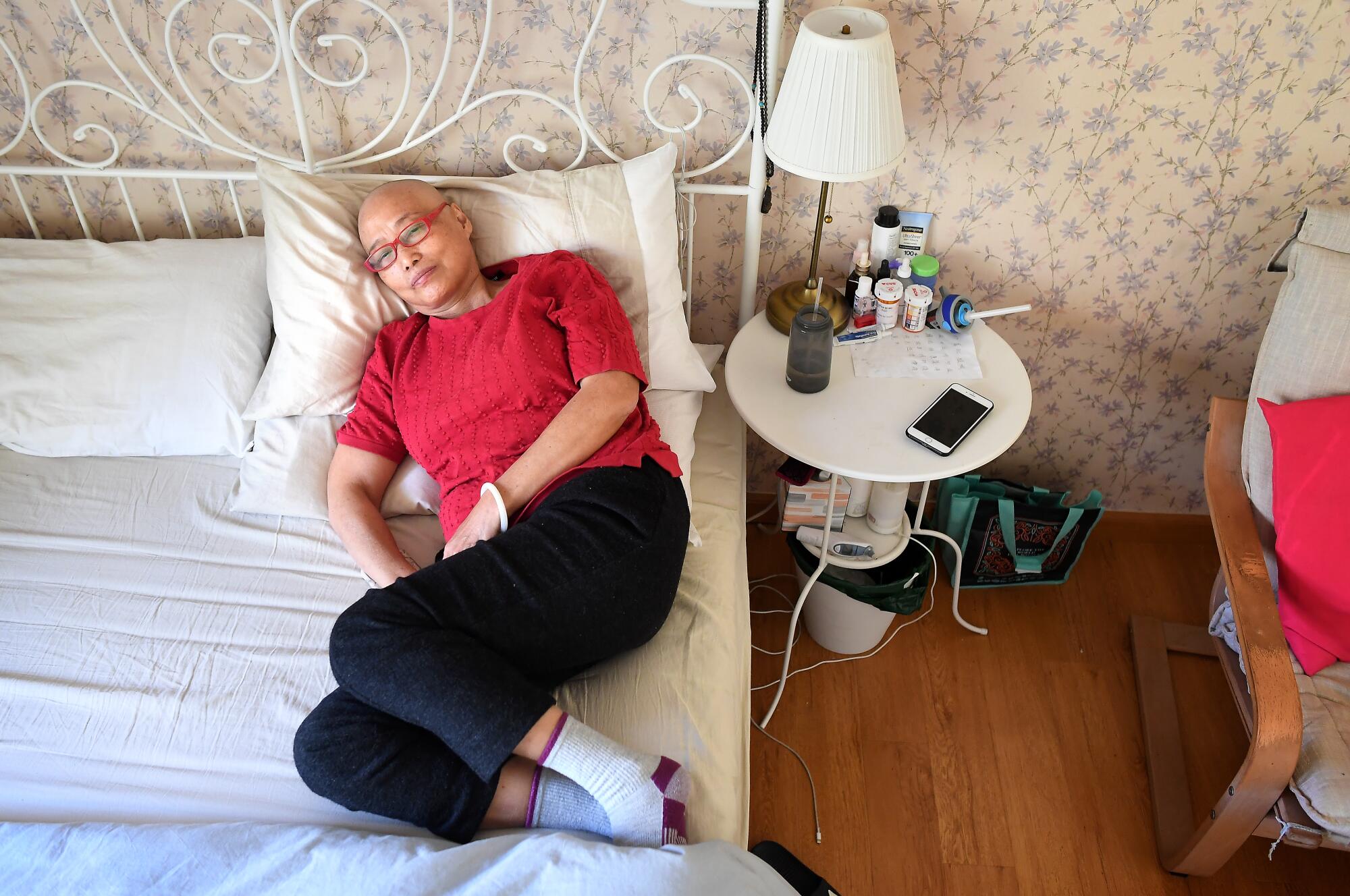
“I am really thin. It is the ugliest moment in my entire life. I hope I can gracefully face this fight with cancer. I am so grateful for all the care and encouragement from my family and loved ones and hope I can keep them company after I am healed.”
Reflecting on her family’s predicament, Luo said she feels lost and struggles to hold onto hope.
Her children started seeing a mental health counselor. On Dec. 2, Lin’s immune system dropped, making her too weak to receive a fifth radiation treatment. And a genetic test had revealed Lin has a gene mutation that could put Luo and other close relatives at higher risk for cancer.
Luo’s parents told her they’re worried about their immigration status. After they return to China, they wondered, will they be allowed back to the U.S. for checkups or to visit their only child and grandchildren?
“There’s lots of question marks right now,” Luo said.
Luo wishes she could give them more answers. For now, she’s focused on what she can do — making daily green smoothies to boost her mother’s immune system, keeping herself healthy with yoga and breathing exercises, helping her kids maneuver online classes and enjoying the extended time with her parents.
More to Read
Sign up for Essential California
The most important California stories and recommendations in your inbox every morning.
You may occasionally receive promotional content from the Los Angeles Times.

